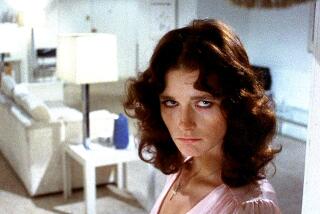Review: ‘78/52’ brilliantly, obsessively breaks down shower scene in ‘Psycho’
- Share via
Obsessive but accessible, the deepest dive imaginable into one of the most celebrated scenes in movie history, the documentary “78/52” looks at a brief three minutes of cinema the way it’s never been looked at before.
Though not everyone would agree with director Alexandre O. Philippe’s contention that the shower sequence in Alfred Hitchcock’s “Psycho” is “the single most iconic and significant scene in the history of motion picture arts and sciences,” his cut-by-cut, almost frame-by-frame celebration and analysis certainly makes for completely fascinating viewing.
A Hitchcock fanatic since he was a boy, Philippe has been entrepreneurial about rounding up articulate, like-minded souls who are as zealous about the sequence’s significance as he is. Included in the conversations (which are made to look like they were shot in a dreary motel) are fellow directors like Guillermo del Toro, Peter Bogdanovich, Karyn Kusama and Eli Roth.
Just as interesting, if not more so, are interviews with knowledgeable below-the-line individuals, including two sound designers and no less than seven editors, including the always incisive Walter Murch.
Also talked to are people with a more personal connection to the film, such as star Janet Leigh’s daughter Jamie Lee Curtis, costar Anthony Perkins’ son Osgood, Hitchcock’s granddaughter Tere Carrubba, and, most memorably, Leigh’s body double Marli Renfro.
“78/52’s” title, which refers to the sizable number of setups and cuts in the shower scene, indicates how laser-focused this documentary is going to be, detailing how and why Hitchcock devoted a full week out of a four-week schedule to shooting that one sequence.
We find out, for instance, that chocolate syrup doubled for blood, that Hitchcock auditioned several kinds of melons to find the one that sounded best when stabbed by a knife (casaba was the winner) and that no detail, not even the nature of the painting that cover the Bates Motel’s illicit peephole, was in any way accidental.
Philippe has also included several interview clips of Hitchcock himself, picking unexpected moments like the director’s insistence to the BBC that he intended the whole thing to be rather tongue-in-cheek.
One of “78/52’s most fascinating digressions is speculation about why, aside from personal psychology, Hitchcock indulged in what one observer calls “an act of aggression against fans, critics, actors.”
Speculation includes the idea that the director wanted to get out of his comfort zone, felt competitive with French director Henri-Georges Clouzot (“Diabolique”) or was conscious that, after films like “Suddenly Last Summer” and “Anatomy of a Murder,” times had changed and he didn’t want to be left behind.
There’s even conjecture that Hitchcock was angry at America and Britain for their lack of preparedness for World War II and saw this film as revenge.
As to what seeing the film feels like, it is perhaps director Del Toro who sums it up best. “You knew you were in the hands of a master,” he says, “and there was nothing to do but submit.”
------------
‘78/52’
Not rated
Running time: 1 hour, 32 minutes
Playing: Laemmle’s Monica, Santa Monica, Playhouse 7, Pasadena
See the most-read stories in Entertainment this hour »
Movie Trailers
More to Read
Only good movies
Get the Indie Focus newsletter, Mark Olsen's weekly guide to the world of cinema.
You may occasionally receive promotional content from the Los Angeles Times.











